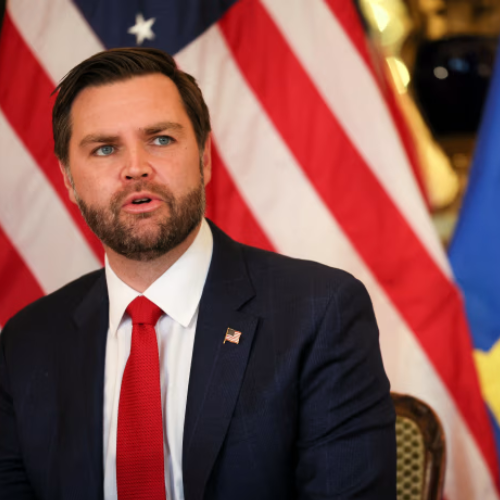In a recent interview, U.S. Vice President JD Vance made a bold statement about the ongoing conflict in Ukraine. He said that the United States was prepared to use tough measures, including sanctions and even military action, if Russian President Vladimir Putin refuses to agree to a peace deal that would ensure Ukraine’s long-term independence. Vance’s remarks come at a time when tensions are high and international pressure on Russia continues to grow.
Vance’s Strong Words on Military and Economic Pressure
Vance, who serves under President Donald Trump, emphasized that the United States has a variety of options to force Russia into a peace agreement. He specifically mentioned economic sanctions as a tool to hurt Russia’s economy and military action as another possible strategy to put pressure on Putin. “There are economic tools of leverage, there are of course military tools of leverage,” Vance explained, signaling that the U.S. is ready to take serious steps to defend Ukraine’s sovereignty.
This statement from Vance marks a sharp contrast to comments made by U.S. Defense Secretary Pete Hegseth. Just a day earlier, Hegseth suggested that the U.S. would not send troops to Ukraine. In contrast, Vance made it clear that sending U.S. soldiers to Ukraine was still “on the table” if Russia continued its refusal to negotiate a peace deal. The Vice President’s words highlight the administration’s commitment to Ukraine’s independence, regardless of the challenges involved.
Brutal Battle: Ukraine’s Rare Earth Minerals and Military Aid Struggle
Trump’s Position on Ukraine and Russia
President Donald Trump, in his own statements, added that he would pursue direct talks with Russian President Putin to bring an end to the war. Trump believes that a peace agreement could be reached that would “shock a lot of people.” However, the details of what such an agreement might look like remain unclear.
In his interview, Vance echoed Trump’s approach, emphasizing that the U.S. administration is open to a deal that could involve negotiations with Russia, but without compromising Ukraine’s independence. Vance said that President Trump would go into talks with an open mind, meaning that all options would be considered. This approach comes at a time when Russia has already taken control of almost 20% of Ukraine’s land.
Vance also acknowledged that negotiations would likely involve compromises, but he insisted that Ukraine must retain its sovereignty and independence. He mentioned that the details, such as what parts of Ukraine would remain under Russian control, would have to be worked out in future talks. Despite the uncertainties, the Vice President stressed that Ukraine’s future as an independent nation was non-negotiable.
Pressure on Europe and a Critique of Mainstream Politics
While the interview focused heavily on the situation in Ukraine, Vance also spoke about European politics, particularly criticizing the continent’s mainstream political leaders. He accused them of using terms like “disinformation” and “misinformation” to silence opposing viewpoints, especially those from populist or anti-establishment groups.
Ukraine’s New Sanctions Cripple Russia’s Captains, Illegal Oil Empire and Cultural Looters
Vance also voiced his concern about European leaders’ failure to work with parties that oppose mass migration. According to Vance, ignoring the concerns of voters who want more control over immigration is harming democracy in Europe. In his speech scheduled for the Munich Security Conference, he plans to urge European leaders to embrace more traditional values, including stricter immigration policies and the acceptance of far-right political groups.
He also criticized European leaders for failing to understand the will of the people, claiming that citizens across Europe were increasingly frustrated with high levels of migration and the censorship of alternative viewpoints. According to Vance, these issues are much more dangerous to democracy than any alleged Russian interference in elections.
In addition, Vance defended Elon Musk, the billionaire tech entrepreneur, who has faced backlash for his support of certain far-right political parties in Europe. European leaders like German Chancellor Olaf Scholz and French President Emmanuel Macron have openly criticized Musk, but Vance sided with him, arguing that Europe’s political leaders were wrong to attack him.
Vance’s comments in the interview and his upcoming speech in Munich are making waves, as he challenges European leaders to rethink their approach to both immigration and democracy. His remarks show that the Trump administration’s stance on global politics is not just about Ukraine, but also about pushing for a broader shift in European policies.


